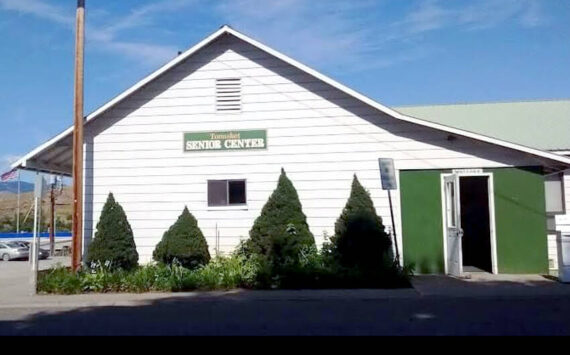Public protests DNS’s termination
TONASKET – Representatives Jason Schmidt and Casey McGourin from McKinstry, an energy services company hired by North Valley Hospital, presented updates on Phase 2 of the project at the hospital’s board meeting Thursday, Feb. 11. Also in attendance was Kirsten G. Wilson, PE (Professional Engineer) from the Washington State Department of Enterprise Services’s Energy Program.
NVH’s board of directors approved proceeding with a geothermal ground source heating and cooling system in 2014, and NVH received a $500,000 energy grant from the Department of Commerce.
The next step in the process, if the hospital chooses to move forward, will be to apply for a permit for wells with the Department of Ecology. McKinstry retained the services of a hydrogeologist to analyze if the wells would produce the needed water flow, and will be drilling six inch test wells before drilling the 12 inch working wells. The project would require 500 gallons of water per minute between the two wells.
“We have done two successful projects in Oroville, at the elementary school and the high school,” said Wilson. “This valley is a good location to be successful in finding water more often or not.”
Wilson said the permitting process with DOE is a 60 day process, so May would be the earliest for any well drilling.
If the test wells are not adequate, the hospital will have to look at other heating system options such as fuel oil boilers or electric boilers.
Schmidt said an option for propane boilers was explored, but there was no where to place a propane tank of the size needed for the project. The electric boilers were the highest cost option, but Schmidt said there was a low chance the Department of Commerce would let the hospital keep the energy grant if they chose that option. Schmidt said the fuel oil burners had the highest emissions, and potential volatility of fuel oil prices. The ground source option has the ability to both heat and cool, with the highest energy savings and lowest emissions.
Phase 2 of the project will include installation of two groundwater extraction wells along with two groundwater injection wells and piping from the wells to the mechanical room. Phase 3 will involve removal of the remaining steam boilers and existing chiller, along with installation of the new heat pump chiller.
Schmidt said the remaining scope and cost to complete the project includes $78,393 for test wells, $723,813 for final wells and $1,385,418 for heat pumps. McGourin said after delays in the project, McKinstry would need to reprice phase 2 and 3 with current market pricing.
Schmidt reported Phase 1 and 1a, which consisted of replacing a failed boiler and heat exchanger being complete, but McKinstry “overlooked” applying to the Department of Health for a Construction Review Permit.
“We pushed hard to get the boiler in before mid-October, but overlooked the Department of Health permitting,” said Schmidt. “McKinstry will cover the $5,000 application fee, with no cost to NVH. It is in and being reviewed.”
Another item with a price tag being considered by the NVH Board of Directors is the hospital’s investment in the Lean Six Sigma program. Consultants Ed Hayes and Mike Talucka attended the meeting to present information and answer any questions board members might have. Hayes said he has been a consultant with Lean Six Sigma since the mid 1990s, working to implement the system with hospitals and different health organizations; including Kittitas Valley Healthcare. Talucka is the former executive director of finance for Group Health.
“When there is more work to be done but no budget for more staff, you need an option besides ‘work harder,’ and Lean Six presents that,” said Talucka, adding that it worked on two principles: continuous improvement and waste elimination.
Ken Radford, the manager of the Respiratory Care Department, reported to the board that he would no longer be routinely scheduled for on-call.
“The goal is to provide a broader spectrum resource base of quality care options through increased multiple disciplines,” said Radford. “There will be more people doing my job.”
Radford said he would provide training and competency evaluations for CRNAs and providers to be responsible for ventilator setup and management.
“Respiratory care is an important part of this facility, so I want to assure continued quality of care,” said Radford.
About 20 members of the community were present during the meeting, two of whom speak up during the public participation session in support of Tina Smith, RN and Director of Nursing Services. Smith was terminated from her position at NVH last week after being employed about 16 years with the hospital.
“I am here to speak on patient care staff; specifically about the termination of our DNS. We all care very much for her; she was supportive of us and she has done a fantastic job of caring for her staff and creating a culture of care,” said Mike Oberg, RN. “I found out yesterday she had been terminated, and I met with Mike (Zwicker) and came away with a lot of questions. I am here to ask the Board to reconsider, and to reinstate Tina. I don’t know much about the situation, but we all feel very strongly she has been a wonderful resource and is competent with the upcoming changes.”
“Employee issues are not something we can deal with,” said Board Chair Helen Casey. “We appreciate your concern, but Mike is our only employee on the board.”
When another man named Matt who identified himself as a nurse at the hospital said that “Tina was much more than just a boss, and when she was let go it was devastating,” Casey responded, “It’s one of those things we can’t discuss in a public setting.”
Zwicker said Monday, Feb. 15, said he didn’t know all the people present in support of Smith, but thought that most of them were NVH employees under her supervision.
When asked if the decision to terminate Smith was a board decision or a decision made by someone else, Zwicker said he could not comment. When asked why Smith was let go, he said he absolutely could not comment.
The Board went in to executive session when the meeting adjourned, under RCW 42.30.110 (1) (g) To evaluate the qualifications of an applicant for public employment or to review the performance of a public employee.
Casey said there would be no action taken after the executive session. Zwicker said he could not comment on the executive session afterward.
There was a reminder on the meeting’s agenda for the Board to complete PDC – Public Disclosure Commission PDC F-1 before April 1.
The next regular board meetings are scheduled for February 25 and March 10. Board meetings begin at 7 p.m.





Comments are closed.